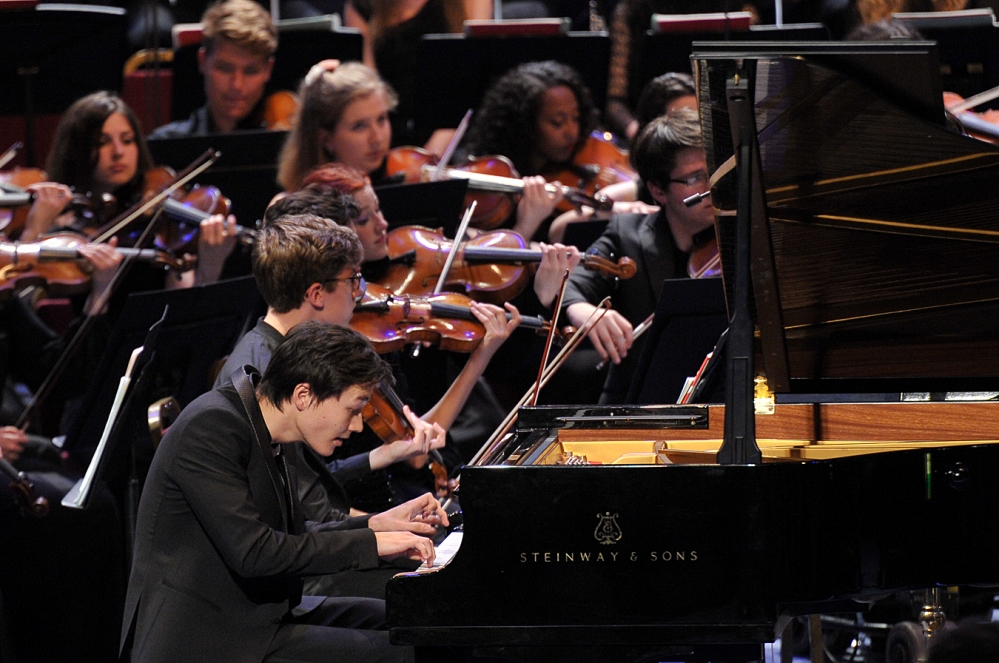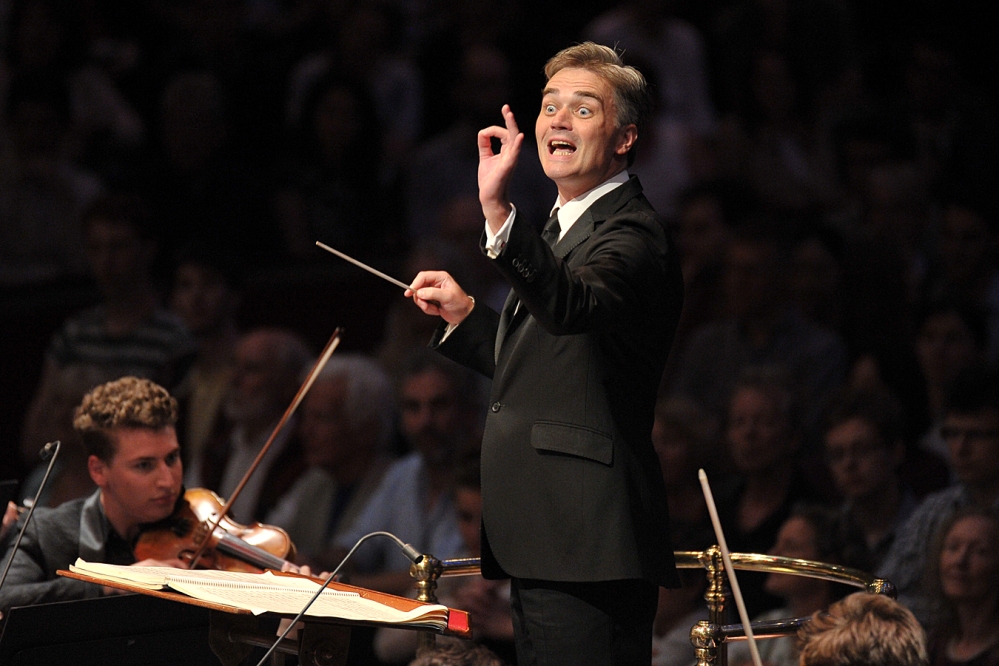Prom 33: Schwizgebel, National Youth Orchestra of Great Britain, Gardner | reviews, news & interviews
Prom 33: Schwizgebel, National Youth Orchestra of Great Britain, Gardner
Prom 33: Schwizgebel, National Youth Orchestra of Great Britain, Gardner
20th century orchestral concertos in a riot of sophisticated colour from terrific teenagers
After the European Union Youth Orchestra hit unsurpassable heights last week, the Proms plateau of excellence remained available to another youth carnival of weird and wonderful 20th century monsters.
Did any allowances need to be made for youth, with an age limit even lower than the EUYO’s (an astonishing sweet 19; the youngest player this year was a 14-year-old trombonist)? Absolutely not, beyond the kind of inevitable brass splits and cracks you occasionally get in a professional orchestra. Once past a smudged song from the cellos several bars in, this Petrushka was razor-sharp, possibly even a bit over-driven by Gardner in the outer fairground scenes.Yet what personality he allowed – coached, perhaps – in Stravinsky’s many solos, beginning with Epsie Thompson’s capricious flute solo coaxing the puppets in the magician’s booth to life and continuing in a string of ineffably phrased earthly delights.

The orchestra takes a bit of a back seat to another puppet come to life, the audacious solo role in Prokofiev’s First Piano Concerto. The Swiss-Chinese pianist Louis Schwizgebel (pictured above), a BBC Radio 3 New Generation Artist, is still in his 20s, albeit the other end of the decade to Prokofiev when he launched his own career in this visiting-card while still at the St Petersburg Conservatory. I had Schwizgebel down as a romantic on the strength of his mature Schubert and Beethoven on a BBC Music Magazine cover disc, but he can do the naughty stuff, the beat poetry, too, dashing off the runs, tongue-pokings and nose-thumbings as well as any enfant terrible. Good to hear detail usually obscured from his colleagues, too, especially the sombre trombone chords which, like so much else in the work, insist on popping up just when you think they’ve had their moment in the sun.
Still, we were longing to hear Schwizgebel alone, especially from a side of the hall where the piano isn’t easily assessed, and he obliged with perfect transcendentalism in Liszt’s transcription of Schubert’s minor-key Serenade. For once the show-off composer didn’t swamp his better; and Schwizgebel made it sound, ever so delicately, like four hands at one keyboard in the canonic echoes of the tune in the last verse. Here’s yet another young pianist deserving of the limelight every inch as much as Benjamin Grosvenor, who by many accounts doesn’t seem to have acquitted himself quite so characterfully in his Proms concerto on Friday.
T
To my ears Gardner (pictured above), a very experienced Lutosławskian, seemed to lose his grip on the vast final Passacaglia, Toccata e Corale, despite or perhaps because of driving it too hard, and the crucial repeated bass line couldn’t be heard at all for minutes from where I was sitting. But that’s no reflection on the players, tireless and brilliant to the end. And what a joy, when the population in the Arena up to last night seemed to have got distinctly older, to see so many young people in the audience. They couldn't have come to a livelier programme.
rating
Share this article
The future of Arts Journalism
You can stop theartsdesk.com closing!
We urgently need financing to survive. Our fundraising drive has thus far raised £49,000 but we need to reach £100,000 or we will be forced to close. Please contribute here: https://gofund.me/c3f6033d
And if you can forward this information to anyone who might assist, we’d be grateful.

Subscribe to theartsdesk.com
Thank you for continuing to read our work on theartsdesk.com. For unlimited access to every article in its entirety, including our archive of more than 15,000 pieces, we're asking for £5 per month or £40 per year. We feel it's a very good deal, and hope you do too.
To take a subscription now simply click here.
And if you're looking for that extra gift for a friend or family member, why not treat them to a theartsdesk.com gift subscription?
more Classical music
 Anja Mittermüller, Richard Fu, Wigmore Hall review - a glorious hall debut
The Austrian mezzo shines - at the age of 22
Anja Mittermüller, Richard Fu, Wigmore Hall review - a glorious hall debut
The Austrian mezzo shines - at the age of 22
 First Person: clarinettist Oliver Pashley on the new horizons of The Hermes Experiment's latest album
Compositions by members of this unusual quartet feature for the first time
First Person: clarinettist Oliver Pashley on the new horizons of The Hermes Experiment's latest album
Compositions by members of this unusual quartet feature for the first time
 Gesualdo Passione, Les Arts Florissants, Amala Dior Company, Barbican review - inspired collaboration excavates the music's humanity
At times it was like watching an anarchic religious procession
Gesualdo Passione, Les Arts Florissants, Amala Dior Company, Barbican review - inspired collaboration excavates the music's humanity
At times it was like watching an anarchic religious procession
 Classical CDs: Camels, concrete and cabaret
An influential American composer's 90th birthday box, plus British piano concertos and a father-and-son duo
Classical CDs: Camels, concrete and cabaret
An influential American composer's 90th birthday box, plus British piano concertos and a father-and-son duo
 Cockerham, Manchester Camerata, Sheen, Martin Harris Centre, Manchester review - re-enacting the dawn of modernism
Two UK premieres added to three miniatures from a seminal event of January 1914
Cockerham, Manchester Camerata, Sheen, Martin Harris Centre, Manchester review - re-enacting the dawn of modernism
Two UK premieres added to three miniatures from a seminal event of January 1914
 Kempf, Brno Philharmonic, Davies, Bridgewater Hall, Manchester review - European tradition meets American jazz
Bouncing Czechs enjoy their Gershwin and Brubeck alongside Janáček and Dvořák
Kempf, Brno Philharmonic, Davies, Bridgewater Hall, Manchester review - European tradition meets American jazz
Bouncing Czechs enjoy their Gershwin and Brubeck alongside Janáček and Dvořák
 Solomon, OAE, Butt, QEH review - daft Biblical whitewashing with great choruses
Even a top soprano and mezzo can’t make this Handel paean wholly convincing
Solomon, OAE, Butt, QEH review - daft Biblical whitewashing with great choruses
Even a top soprano and mezzo can’t make this Handel paean wholly convincing
 Two-Piano Gala, Kings Place review - shining constellations
London Piano Festival curators and illustrious friends entertain and enlighten
Two-Piano Gala, Kings Place review - shining constellations
London Piano Festival curators and illustrious friends entertain and enlighten
 Echo Vocal Ensemble, Latto, Union Chapel review - eclectic choral programme garlanded with dance
Beautiful singing at the heart of an imaginative and stylistically varied concert
Echo Vocal Ensemble, Latto, Union Chapel review - eclectic choral programme garlanded with dance
Beautiful singing at the heart of an imaginative and stylistically varied concert
 Scott, Irish Baroque Orchestra, Whelan, RIAM, Dublin review - towards a Mozart masterpiece
Characteristic joy and enlightenment from this team, but a valveless horn brings problems
Scott, Irish Baroque Orchestra, Whelan, RIAM, Dublin review - towards a Mozart masterpiece
Characteristic joy and enlightenment from this team, but a valveless horn brings problems
 Classical CDs: Voice flutes, flugelhorns and froth
Baroque sonatas, English orchestral music and an emotionally-charged vocal recital
Classical CDs: Voice flutes, flugelhorns and froth
Baroque sonatas, English orchestral music and an emotionally-charged vocal recital

Add comment